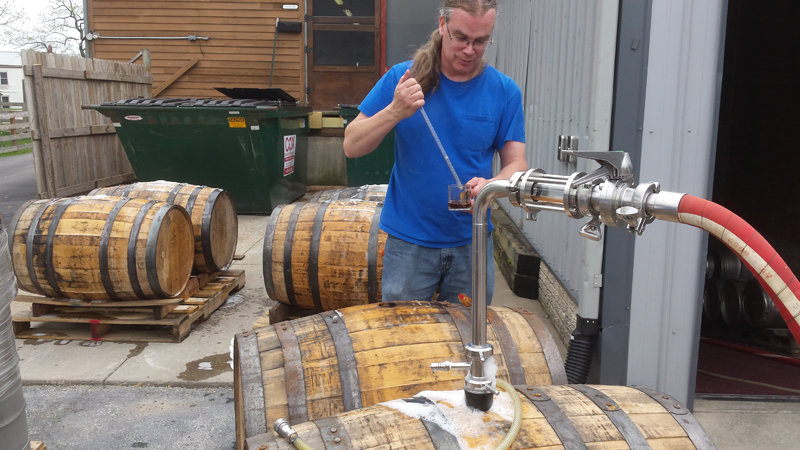For Carroll Zuber, like many others, it started with an epiphany in Europe. While traveling in what is now Germany in 1975, the financial planner from Iowa discovered the sorts of flavorful beers that were in increasingly short supply in the U.S., where the recently introduced Miller Lite was taking the marketplace by storm.
Within nine years, Zuber co-founded the Millstream Brewing Co. in Amana, Iowa, about 80 miles northwest of Davenport. Zuber and his partners, brothers James and Dennis Roeming, owners of a restaurant in Amana, incorporated with the state in November 1983, and opened their brewery two years later. The moves brought what was then called micro-brewing to Iowa, upon which all political eyes now fall amid its first-in-the-nation presidential caucus.
It was an auspicious time to be brewing beers in small batches with more traditional ingredients, particularly in that part of the nation. The approach was starting to take, however tenuously, on the West and East coasts, but, in the vast middle of the U.S., it was still a novelty. There were a couple of such breweries in Michigan, the doomed Real Ale Co. and the more successful Bells, and one called Summit Brewing starting up in St. Paul, Minnesota.

Past and present owners of Millstream Brewing reunited at the brewery’s 30th anniversary party in 2015, from left to right: Chris Priebe (current owner, brewmaster), Carroll Zuber (founder), Janet Zuber (Founder), JoAnn Henderson (previous owner), Dennis Henderson (previous owner), Terry Roemig (founder), Jim Roemig (founder), Teresa Albert (current owner) and Tom Albert (current owner). (Photo courtesy Millstream Brewing Co.)
Otherwise, the terrain was arctic. In Iowa itself, the big brewing news of Millstream’s startup era was the winding down of Jos. S. Pickett & Sons, a Dubuque brewery that could trace its origins to the 1890s, when it launched as the Dubuque Star Brewery. Joseph Pickett Sr., a former Pittsburgh Steeler turned master brewer, acquired it in the 1970s, renaming it and renovating its Prohibition-era technology.
Its well-received brands, such as Pickett’s Premium (made with corn only from Iowa) and its distribution reach into neighboring Wisconsin and Illinois, could not save Jos. S. Pickett & Sons from the waves of consolidation rolling over American brewing. The brewery would shutter under a new owner whom the Picketts sold to at the start of the 1980s, though various entities would attempt to resurrect it, including under the Dubuque Star name, into the late 1990s.
As for Joseph Pickett, his influence on brewing lived on through Millstream, the brewery and the beers of which he helped design, along with his son, Joe Jr. Millstream’s initial offerings were Schild Brau Amber Lager and Millstream Lager (“schild” means “shield” in German, and can be taken as the equivalent of “trademark” or “family crest”—hence, the name of Millstream’s trademark beer). They were anomalies in American micro-brewing at the time, almost as risky style-wise as the brewery was business-wise. Simply put, most start-ups brewed ales, not lagers.
By 1987, Schild Brau and Millstream Lager were drawing considerable attention. A visiting correspondent that year from The New York Times pronounced both beers “very tasty.” Another visitor, a brewer from Anheuser-Busch’s St. Louis headquarters, also stopped by unannounced.

Millstream Brewing Co.’s current brewmaster Chris Priebe (Photo courtesy Millstream Brewing Co.)
Other Millstream offerings followed—the brewery now offers 15 beers total, including seasonals and limited runs; though it discontinued Millstream Lager (Schild Brau is still its trademark). Other Iowa breweries also followed. In 1992, Davenport’s Front Street Brewery became Iowa’s second micro-brewery, according to J. Wilson’s Iowa Pints: A Guide to Iowa’s Breweries.
As for Millstream, it would change ownership in late 2000, during a tumultuous time for the wider industry. What was now called “craft brewing” was undergoing a convulsive shakeout, with hundreds of operations shuttering. Iowa’s first micro-brewery—and the state’s longest operating one, period—endures, however, under those 2000 buyers: spouses Tom and Teresa Albert and Chris Priebe, a former Dubuque Star brewer and Millstream’s brewmaster.
Read more Acitelli on History posts.
Tom Acitelli is the author of The Audacity of Hops: The History of America’s Craft Beer Revolution. His new book is a history of American fine wine called American Wine: A Coming-of-Age Story. Reach him on Twitter @tomacitelli.

Leave a Reply